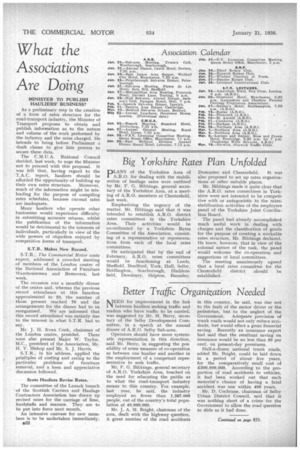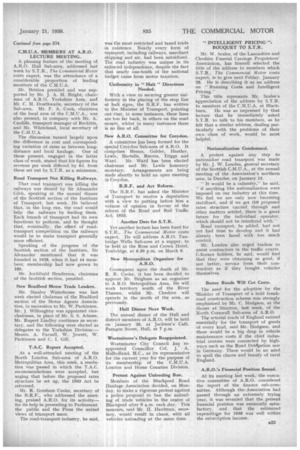Better Traffic Organization Needed MEED for improvement in the link
Page 18

Page 19

If you've noticed an error in this article please click here to report it so we can fix it.
1 N between hauliers seeking traffic and traders who have traffic to be carried, was suggested by Mr. H. Berry, secretary of the Selby Development Committee, in a speech at the annual dinner of A.R.O. Selby Sub-area.
Operators should have more systematic representation in this direction, said Mr. Berry, in suggesting the pos. sibility of some measure of co-operation as between one haulier and another in the employment of a competent representative to seek traffic.
Mr. F. G. Bibbings, general secretary of A.R.O. Yorkshire Area, touched on the need for educating the public as to what the road-transport industry means to this country. For example, last year, he said, the industry employed no fewer than 1,287,000 people, out of the country's total population of 40,000,000.
Mr. J. A. M. Bright, chairman of the area, dealt with the highway question. A great number of the road accidents
in this country, he said, was due not to the fault of the motor driver or the pedestrian, but to the neglect of the Government. Adequate provision of trunk roads would not only reduce accidents, but would effect a great financial saving. Recently an insurance expert had said that the resultant saving on insurance would be no less than 50 per cent. on present-day premiums.
Half-a-dozen national trunk roads, added Mr. Bright, could be laid down in a period •of about five years, for the comparatively small cost of 4200,000,000. According to the proportion of road accidents to vehicles, it had been worked out that each motorist's chance of having a fatal accident was one within 400 years.
Mr. D. Cochrane, chairman of Selby Urban District Council, said that it was nothing short of a crime for the Government to allow the road question to slide as it had done. C.M.U.A. MEMBERS AT A.R.O. LECTURE MEETING.
A pleasing feature of the meeting of A.R.O. Hull Sub-area, addressed last week by S.T.R., The Commercial Motor costs expert, was the attendance of a considerable proportion of leading members of the C.M.U.A.
Mr. Britton presided and was supported by Mr. J. A. M. Bright, chairman of A.R.O. Yorkshire Area, and Mr. C. M. Douthwaite, secretary of the Sub-area. Mr. F. A. Cook, chairman of the local area of the C.M.U.A., was also present, in company with Mr. A. Cunliffe, transport manager of Reckitts, and Mr. Whitehead, local secretary of the C.M.U.A.
The discussion turned largely upon the difference in cost and corresponding variation of rates as between longdistance and local haulage. One of those present, engaged in the latter class of work, stated that his figures for revenue per week differed by 6d. from those set out by S.T.R. as a minimum.
Road Transport Not Killing Railways.
That road transport was killing the railways was denied by Sir Alexander Gibb, speaking at the annual dinner of the Scottish section of the Institute of Transport, last week. He believed that, in the long run, the road would help the railways by feeding them. Each branch of transport had its own functions to perform, and he thought that, eventually, the effect' of roadtransport competition on the railways would be to make transport generally more efficient.
Speaking of the progress of the • Scottish. section of the Institute, Sir Alexander mentioned that it was founded in 1928, when it had 44 members; membership had now grown to 189. .
Mr. Archibald Henderson, chairman of the Scottish section, presided.
New Bradford Motor Trade Leaders.
Mr. Stanley Waterhouse was last week elected chairman of the Bradford section of the Motor Agents Association, in succession to Mr. W. Parkinson. Mr. J. Willoughby was appointed vicechairman, in place of Mr. S. S. Adams. Mr. Rupert Lindley continues as secretary, and the following were elected as delegates to the Yorkshire Division:— Messrs. A. Farnell, W. Jowett, W. Parkinson and C. I. Gill.
T.A.C. Report Accepted.
At a well-attended meeting of the North London Sub-area of A.R.O. Metropolitan Area, this week, a resolution was -passed in which the T.A.C. recommendations were accepted, but urging that before the proposed rates structure be set up, the 1933 Act be reformed.
Mr. R. Gresham Cooke, secretary of the B.R.F., who addressed the meeting, praised A.R.O. for its activity— for its help in presenting to Parliament the public and the Press the united views of transport users.
The road-transport industry, he said, was the most restricted and taxed trade in existence. Nearly every form of transport, including railways, merchant shipping and air, had been subsidized. The road industry was unique in its enforced independence, despite the fact that nearly one-tenth of the national budget came from motor taxation.
Uniformity in " Halt " Directions Needed.
With a view to securing greater uniformity in the placing of the stop line at halt signs, the B.R.F. has written to the Minister of Transport, pointing out that, 112 some instances, these lines are too far back, in others on the road mouth, whilst in many instances there is no line at all.
New A.R.O. Committee for Croydon.
A committee has been formed for the special Croydon Sub-area of A.R.O. It comprises Messrs. Golder, Heatley, Lewis, Delartells, Reeves, Triggs and Ward: Mr. Ward has been elected chairman and Mr. Lewis honorary secretary. Arrangements are being made shortly to hold an open meeting in Croydon.
B.R.F. and Act Reform.
The 13.R.F. has asked the Minister of Transport to receive a deputation with a view to putting before him a volume of opinion in favour of the reform of the Road and Rail Traffic Act, 1933.
Another Date for S.T.R.
Yet another lecture has been fixed for S.T.R., The Commercial Motor costs expert. He will address A.R.O. Tunbridge Wells Sub-area at a supper, to be held at the Rose and Crown Hotel, Tonbridge, at 6.30 p.m. on March 9.
New Metropolitan Organizer for A.R.O.
Consequent upon the death of Mr. R. R. Cooke, it has been decided to appoint Mr. Brigham as an organizer to A.R.O. Metropolitan Area. He will work territory south of the River Thames, whilst Mr. Cheshire will operate in the north of the area, as previously.
Hull Dinner Next Week.
• The annual dinner of the Hull and district members of A.R.O. will he held on January 29, at Jackson's Café, Paragon Street, Hull, at 7 p.m.
Westminster's Delegate Reappointed. Westminster City Council has reappointed Councillor Col. J: A. Mulholland, M.C., as its representative for the current year for the purpose of its membership of the C.M.U.A. London and Home Counties Division.
Protest Against Unloading Ban.
Members of the Blackpool Road Haulage Association decided, on Monday, to make a vigorous protest against a police proposal to ban the unloading of trade vehicles in the centre oi Blacicpool after 9 a.m. each day. This measure, said Mr. H. Hardman, secretary, would result in chaos, with all vehicles unloading at the same time. "INTELLIGENT PRICING "i BOUQUET TO S.T.R.
Mr. W. Scales, of the Lancashire and Cheshire Funeral Carriage Proprietors' Association, has himself selected the title of the address to members which S.T.R., The Commercial Motor costs expert, is to give next Friday, January 28. He is describing it as an address on "Running Costs and Intelligent Pricing."
This title represents Mr. Scales's appreciation of the address by S.T.R. to members of the C.M.U.A. at Blackburn. He was so impressed by that lecture that he immediately asked S.T.R. to talk to his members, as he felt that a similar address, dealing particularly with the problems of their own class of work, would be most helpful.
Nationalization Condemned.
A protest against any step to nationalize road transport was made by Mr. J. W. Louden, general secretary of the Scottish C.M.U.A., at the annual meeting of the Association's northern area, in Dundee, on January 13.
" It would be a calamity," he said, " if anything like nationalization were imposed on our industry at this time. We feel we are only now becoming stabilized, and if we get tilt' proposed rates structure carried through and other matters settled, there is a great future for the individual operator, which should not he interfered with.'' Road transport, he added, had not yet had time to develop and it had already been faced with too much control.
Mr. Louden also urged traders to assist contractors in the traffic courts. C-licence holders, he said, would find that they were obtaining as good, if not better, service from their contractors as if they bought vehicles themselves.
Better Roads Will Cut Costs.
The need for the adoption by the -Ministry of Transport of a bold trunkroad construction scheme was strongly emphasized by Mr. C. Hodgson, at the dinner at Stratton, last week, of the North Cornwall Sub-area of A.R.O.
Tlv arterial roads of England existed essentially for the transport of goads of every kind, said Mr. Hodgson, and there would be a big drop in vehicle maintenance costs if the chief industrial centres were connected by highways such as the Road De14gation saw in Germany. There would be no need to spoil the charm and beatify of rural England.
A.R.O.'s Financial Position Sound.
At its meeting last week, the executive committee of A.R.O. considered the report of the finance sub-committee. Although the, Association had passed through an extremely trying year, it was revealed that the present financial position was eminently satisfactory, and that the estimated expenditue for 1938 was well within the subscription income.






























